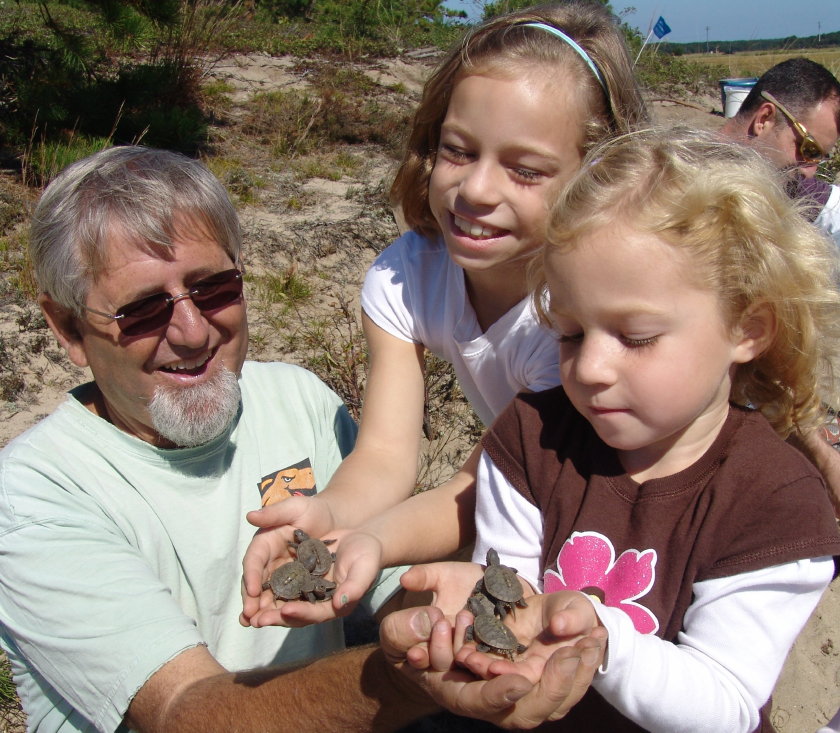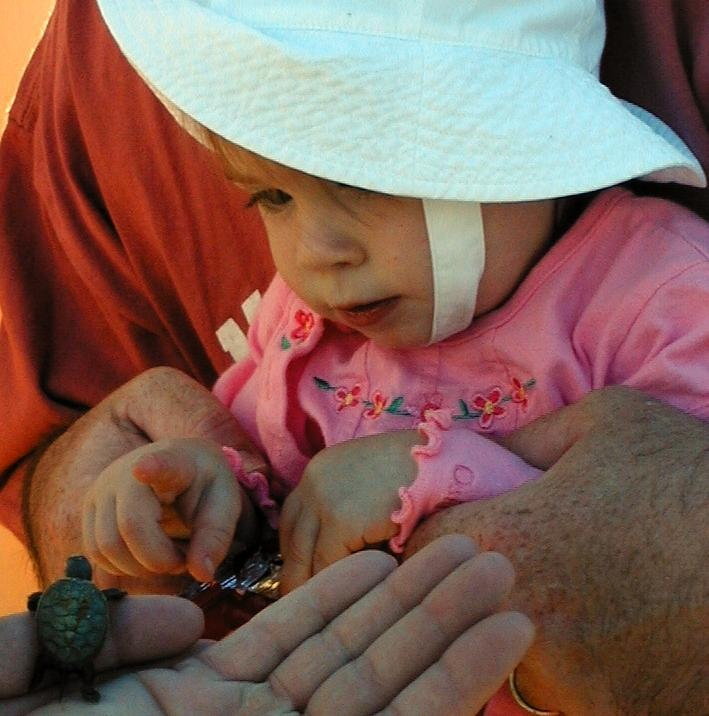Young Herpetologist Meets Her First Terrapin Hatchling
The most sacred duty of any naturalist, especially one with thinning silver locks, involves sharing the experience of Nature and recruiting successors among the next generation to continue the critical mission of observation, documentation and conservation. While my colleagues and I employ undergraduate and graduate interns each season to “learn the trade” of field science, our special joy comes from opportunites to engage with the youngest scientists, those for whom an adventure in the wild becomes a transformational experience that may change the course of their lives and the future of our world.Â
Don Lewis and Young Herpetologists with Terrapin Hatchlings
Partnering with such exceptional conservation advocates as the Massachusetts Audubon Society, the National Marine Life Center, the Cape Cod Museum of Natural History, and Massachusetts Marine Educators (among too many others to mention in a short post), we have had the privilege to introduce children from nine months to nine decades to Nature through the unparalleled teaching model of turtles. Seemingly helpless hatchlings melt the hardest hearts. I’ve watched jaded curmudgeons with expressions so sour they could change sunshine into hail; I watched their eyes mist as they witnessed a tiny hatchling poke its head through its eggshell at the instant of birth. For children who come to the field with fewer preconceptions of the natural world, these interactions are pure joy.
Discovering a Hatchling as It Emerges from the Egg
Because turtles, and especially hatchlings, appear so accessible to children, they create an immediate and tangible link with Nature. In decades of wildlife research and education, we have never encountered a person WITHOUT a turtle story to tell. Often an octogenarian will smile the smile of a todler as her eyes beam and she tells the tale of how her dad introduced her to a baby turtle he had found in the pond behind their home.
Baby Meets Baby
We can never forget the young girl who eagerly and tenderly held a four-year-old snapping turtle at the Earth Day celebration at Mass Audubon’s Wellfleet Bay Wildlife Sanctuary in 2003. We wonder how she showed no fear of what this then timid turtle would become as it grew into a mighty and fearsome snapper. She simply felt the joy of touching Nature in such a personal way.
Four-Year-Old Meets Four-Year-Old Snapping Turtle
During field season, we use every opportunity to involve children in our research, especially when releasing critters back into the wild. On the beaches of the Outer Cape, the setting is perfect for youngsters to meet turtles in a completely natural venue and to learn about them in ways that books simply can never convey.
Turtles Create Transformational Moments
A message from today’s post? Take every opportunity to introduce children to Nature and show them critters in their natural habitat. The rewards of the moment will be enormous as you see pure, honest joy burst across their faces. But this singular experience will pay dividends for a lifetime as memories form touchstones that will shape the course of their lives and the future of our world. Bring your family into Nature and see what futures you, too, can create.
Hatchlings Released into Nursery Salt Marsh off Turtle Point
Tags: adventure, baby turtle, beaches, birth, books, Cape Cod Museum of Natural History, children, colleagues, conservation, curmudgeons, documentation, Earth Day, Education and Art, field science, field season, generation, graduate, hatchling, hatchlings, hepetologists, interns, joy, locks, Massachusetts Audubon Society, Massachusetts Marine Educators, National Marine Life Center, natural world, naturalist, nature, next generation, Next Generation of Herpetologists, observation, octogenarian, Outer Cape, recruiting, sacred, scientists, Snapping Turtle, teaching model, The New Naturalists, transformational experience, Turtles, undergraduates, wildlife research, young scientists





What a fantastic testimony to the power of a tiny turtle. Thank you!